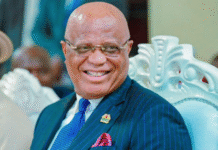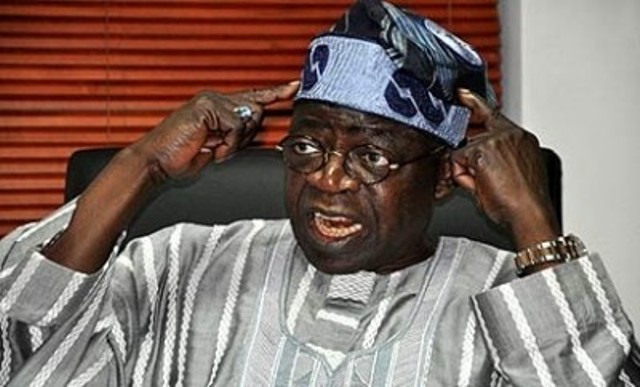Farooq Kperogi
There have been at least two prominent instances when President Bola Ahmed Tinubu betrayed what I have called presidential dissociative disorder, which I define as power-induced divorce from everyday reality evinced by presidents who are ensconced in a bubble, who are sheltered from the real truth, and who are nourished with a steady staple of comforting falsehoods by obsequious aides.
During bilateral talks in Brazil on August 26, 2025, Tinubu boasted that his two-year presidency has stamped out corruption from Nigeria. “It’s getting clearer to the people,” he said. “We have more money for the economy, and no more corruption.”
Again, on September 3, 2025, he claimed that when he became president in May 2023, the naira was trading at ₦1,900 to the dollar, and that his administration has since stabilized it at around ₦1,450. “The economy has stabilized,” he said. “Nobody is trading a piece of paper for an exchange rate anymore. When I took over, it was ₦1,900 to a dollar, it’s ₦1,450 now.”
These wildly inaccurate claims have been fact-checked by multiple news outlets and found to be emphatically false. But these self-serving presidential mendacities are too nakedly transparent to even warrant fact-checking. You only need to be alive, well, and with a halfway functioning brain between May 2023 and now to know the truth.
Because of my long-term interest in the psychology of power, I am less concerned with the facticity of the president’s claims than the motive force behind them. My widely shared July 27, 2019, column titled “How Political Power Damages the Brain—and How to Reverse it” talks about how the intoxication of power, and the literal brain damage it causes, can deaden the moral sensibilities of, weaken the faculty for empathy in, and activate dissociation from reality by people who wield it.
I extended this insight into former President Muhammadu Buhari’s tendency to inhabit a universe that was completely disconnected from everyday Nigeria. In his parallel universe, I observed, he had transformed Nigeria into a Nirvana where there was a superfluity of the best imaginable nourishment for everyone and where life was pleasant, pleasurable, and perfect.
Recall that in the aftermath of a horrendously bloodstained communal upheaval in Taraba in March 2018, which compelled him to pay a forced sympathy visit to affected communities, Buhari told grieving communities that he had fulfilled his campaign promise to secure the nation.
“Today, even our worst enemy can attest to the fact that the APC-led federal government has done well in the area of security,” he said. “We have decimated Boko Haram, while the fight against corruption is going on well.” If the government had “done well in the area of security,” why was he on a tour of scenes of bloodletting?
I called his condition presidential dissociative disorder. Tinubu is suffering from the same disorder. That’s the context of his claims to have eliminated corruption and improved the worth of the naira, even though the exact opposite is actually the truth.
Just like Tinubu said there was “no more corruption” in Nigeria and that the economy had “stabilized,” Buhari also boasted during a speech at the inauguration of his ministers on August 19, 2019, that he had “secured” the country, “improved the economy” and “fought corruption” to a standstill, adding “none but the most partisan will dispute that we have made headway in all three areas.”
Only power-drunk, brain-damaged people who are unmoored from reality and dissociated from the real world would even joke (let alone assert with a straight face) that Nigeria’s economy has improved or stabilized, and that corruption is being fought or has ceased to exist.
That’s why I think both Buhari and Tinubu are victims of presidential dissociative disorder (PDD). It’s a condition that causes presidents to take rent-free residence in cloud-cuckoo-land and that uncouples them from the experiential realities of real living people.
But I am concerned only with Tinubu in today’s column. There’s no doubt that Tinubu’s thoughts and actions and the reality in the country have parted company. What is sadder still is that his dissociative disorder is infectious. All his aides have caught it. In their world, everything is perfect. Only “haters” think otherwise. That’s why the entire country is caught in a state of suspended animation.
As I pointed out in the July 2019 column, researchers in the psychology of power have found out that excessive praise from subordinates, sycophantic drooling from people seeking favors, control over vast resources they once didn’t have, and all of the staid rituals and performances of power conspire to cause “functional” changes to the brains of people in power.
On a social level, it also creates what Lord David Owen, a British neurologist-turned-politician, called the “hubris syndrome” in his 2008 book titled In Sickness and in Power.
Some features of hubris syndrome, Owen points out, are, “manifest contempt for others, loss of contact with reality, restless or reckless actions, and displays of incompetence.” Sounds familiar?
But this power-induced dissociative disorder isn’t inevitable, as I pointed out. If Tinubu and the people who can persuade him are interested in coupling him back to reality, they might find these paragraphs I wrote from the 2019 column:
“Powerful people can, and indeed do, extricate themselves from the psychological snares of power if they so desire. Professor Keltner said one of the most effective psychological strategies for people in power to reconnect with reality and reverse the brain damage of power is to periodically remember moments of powerlessness in their lives—such as when they were victims of natural disasters, accidents, poverty, etc.
“They should also have what American journalist Louis McHenry Howe once called a “toe holder,” that is, someone who doesn’t fear them, expects no favors from them, and can tell them uncomfortable truths without fear of consequences.
“Winston Churchill’s toe holder was his wife, who once wrote a letter to him that read, in part, ‘I must confess that I have noticed a deterioration in your manner; & you are not as kind as you used to be.’….
“Another potent way to reverse power-induced brain damage is to periodically get out of the protected silos of power and solitarily observe the quotidian interactions of everyday folks—their humor, laughter, fights, etc. — without the familiar add-ons of power, such as aides, cameras, security, etc. This helps to stimulate the experiences of others and restore empathy.
“This is particularly important in Nigeria because power, at all levels, is almost absolute and unaccountable.”
Tinubu still has time, if he so chooses, to inoculate himself against the worst ravages of presidential dissociative disorder by embracing humility, surrounding himself with truth-tellers instead of flatterers, and venturing beyond the suffocating cocoon of sycophancy that now imprisons him.
But if he continues to luxuriate in his own delusions and to mistake fantasy for fact, he will not only deepen his personal divorce from reality but also drag the entire country deeper into the perilous fog of collective hallucination. And history, which has a long memory, will not be as forgiving as his aides.
Tribune





























































